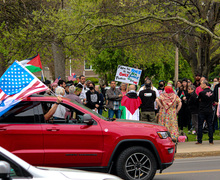John Jankovic’s focus on local activism influences Student Association presidential campaign
Katie Reahl | Staff Photographer
Serena Fazal (left) and John Jankovic, both Syracuse University sophomores, are campaigning for Student Association vice president and president, respectively.
Last fall, John Jankovic realized Student Association presidential candidates had traditionally been seniors. As the organization’s historian, Jankovic wondered why more underclassmen weren’t running for SA leadership.
That’s part of the reason why Jankovic and one of his best friends, Serena Fazal, are now running for SA president and vice president, respectively, for Syracuse University’s 2018-19 academic year.
“I just decided to take it upon myself because I thought I had the qualifications and … yeah, why not now?” said Jankovic, a sophomore political science and psychology dual major.
Jankovic was the second SA presidential candidate to launch a campaign this spring. He and Fazal said the fresh ideas they bring to the table distinguish their bid for SA leadership. Both are part of “the younger crowd” Jankovic said he’d been looking for in SA leadership.
The duo share a Google Calendar to organize their schedules. They frequently text one another. It takes a lot of communication to run a campaign, Jankovic said, and their friendship dates back prior to their freshman years.
I just decided to take it upon myself because I thought I had the qualifications and … yeah, why not now?John Jankovic, SA presidential candidate
Jankovic and Fazal met before orientation. They had the same adviser, and the two wound up together in a room at a Physics Building event. Jankovic realized Fazal was from Chicago, and he asked her about it. Jankovic, who grew up in New York City, had always loved Chicago.
“We kind of just picked it up and were like, ‘Hey wanna grab lunch?’ and we introduced each other to our friends and ran into each other on the Quad, and here we are,” Jankovic said.
Both shared similar interests, particularly in campus activism and community involvement. Jankovic, in his freshman year, learned of a $1.75 million grant the university’s Martin J. Whitman School of Management received from the Charles Koch Foundation. Whitman announced the grant award in November 2016.
The Koch brothers, Charles and David, have spent tens of millions of dollars to support research at hundreds of universities. That research has sometimes been used by lawmakers to advocate for legislation supporting free-market capitalism.
Jankovic, a member of the local Democracy Matters chapter, said many people were concerned by the grant. He put together a petition of campus community members who requested SU to release the grant’s contract publicly. That idea and the contract were eventually discussed by the University Senate.
Fazal, meanwhile, joined the National Association of Latino Fraternal Organizations and became involved in Greek organizations. The two found common ground in their activism and involvement in the wake of Hurricane Maria, which devastated Puerto Rico and left millions of people without power. They both participated in SA’s relief trip to the island over winter break.
“Coming from NYC, I was impacted by (Hurricane) Sandy. During (Hurricane) Irene we had to move,” Jankovic said. “It was really, really scary … but we kind of had this aid coming toward us. It was nothing compared to Puerto Rico.”
Jankovic remembers walking up a hill during one of the SA group’s last days in Puerto Rico. He and his group only had three bottles of water left, he said. The students gave the bottles to a group of children there.
“That’s kind of what inspired us, especially me, because I need to get on a bigger platform to promote disaster relief, international awareness, advocacy,” Jankovic said.
Vanessa Davila, a sophomore in the College of Arts and Sciences, serves as the pair’s campaign manager. Davila said she knows that, if elected, she can believe in Jankovic’s administration.
“I feel like, if anything, we can bring a newer perspective that people can bring. When you’re at the end of your college career, you’re in a different place than when you’re in the middle of it,” Davila said. “Even though you might have more experience on campus.”
Published on April 3, 2018 at 10:05 pm
Contact Sam: [email protected] | @SamOgozalek





